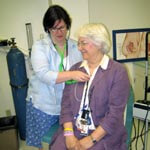
Texas women need more help if they are to navigate a fragmented and complex health care system to get the care they need. For example, Texas ranked 49th among the states in the rate of women who received a mammogram the last two years.
Women, health care professionals and administrators gathered May 11 at the University Health Center Downtown to announce the launch of a clinic that will provide “one-stop” health care for San Antonio women. The National Women’s Center of Excellence Clinical Care Center is a new collaboration of the Health Science Center, the University Health System, the San Antonio Metropolitan Health District and the University Physicians Group.
The U.S. Department of Health and Human Services (HHS) recently selected San Antonio and these institutional partners as one of only two new sites for a National Women’s Center of Excellence. The designation enables expanded multidisciplinary clinical care, an increased education and training component, and enhanced research activity in women’s health issues. The HHS Office of Women’s Health awarded the four-year, $600,000 contract.
“We have joined Harvard, Yale, UCLA and other nationally recognized centers, and that says a lot about San Antonio,” said Martha Medrano, M.D., M.P.H., one of the Women’s Center of Excellence investigators and assistant dean of continuing medical education in the Health Science Center’s School of Medicine. She said the new clinical service site is an important piece of the new center, which will involve all five schools of the Health Science Center.
“The focus is to provide total health care for the woman, with emphasis on prevention of cancer, diabetes, cardiovascular disease and HIV,” added Donald J. Dudley, M.D., professor of obstetrics and gynecology at the Health Science Center and center director of the National Center of Excellence in Women’s Health. “We will be working in the areas of most need and hopefully serving women who have neglected preventive health care over the years.”
“To do this, we are marshalling the resources of our three collaborating institutions,” said Theresa De La Haya, M.P.H., R.N., vice president of the Texas Diabetes Institute with the University Health System. “We are proud to be a part of this vital service to women of our community and region.”

Carann Easton, R.N., B.S.N., an employee at the Health Science Center, has seen first-hand the problems women have in navigating the health care system. She has worked with women patients in the ob-gyn department at the Health Science Center. She also went through her own experience with lymphoma cancer in 2003.
“I noticed a puffy area before Christmas 2002,” she said. “In January I was coping with the death of my dad, in February I was working on my master’s degree thesis, and by the start of April I thought, ‘Wow, I’ve got to get in for a mammogram.’” Although she waited to seek treatment, Easton was fortunate. Today she is disease-free after having chemotherapy and radiation in 2003.
“It needs to be one location for everything rather than running all over the place,” she said of women’s health care. “Many women lack sick leave or personal time or any of the benefits I had. Especially tragic, women who are at risk for diabetes are falling through the safety net. Something needs to be done for them before they get sick.”
Many women are indeed falling behind. Women now are more likely than men to die from a heart attack. The number of women dying from complications associated with diabetes and stroke is rising. The new National Women’s Center of Excellence Clinical Care Center will give San Antonio women the chance to have all of this care coordinated for them in one place.
That will be accomplished through a patient navigator program, said Laura Sterling, M.D., assistant professor of family and community medicine, who also spoke at the clinic launch. She said the navigator program will “help women to make all the connections.”
Linda Hook, nurse program manager with the San Antonio Metropolitan Health District, said the new center will focus on changing behavior – in a word, prevention. She said the Health District has taken care of San Antonio for 100 years and is delighted to partner with an academic institution and a large health care system.
Texas has one of the worst records in the nation across all measures of preventive care. In addition to its low rate of women having mammograms, Texas ranked 47th in the percentage of women who underwent a Pap smear in the past two years and 42nd in the percentage of women who had routine check-ups. Texas has one of the highest rates of diabetes-related deaths among U.S. women (81.7 per 100,000), ranking the state 44th in that category.

